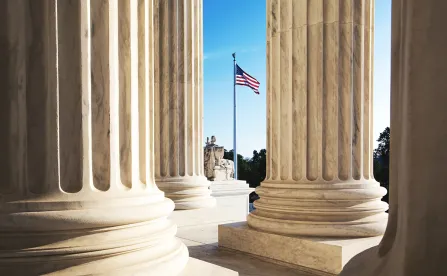The U.S. Supreme Court has found that Philadelphia’s ordinance requiring a private foster care agency to certify same-sex couples as foster parents burdened the agency’s religious exercise in violation of the Free Exercise Clause of the First Amendment. Fulton et al. v. City of Philadelphia, Pennsylvania et al., No. 19-123 (June 17, 2021).
Justice John Roberts, writing for the Court, found that Philadelphia unconstitutionally burdened the religious exercise of Catholic Social Services (CSS) — a private foster care agency in Philadelphia — by “forcing it to either curtail its mission or to certify same-sex couples as foster parents in violation of its religious beliefs.”
The Court’s decision primarily focused on whether Philadelphia’s Fair Practices Ordinance was both neutral and generally applicable and, therefore, constitutional, even if it incidentally burdened religion. For employers, however, the Court’s decision that CSS’s actions were not subject to the public accommodation provisions of Philadelphia’s Fair Practices Ordinance presents significant implications in cases alleging discrimination in places of public accommodation. The scope of this decision is limited in its application to the private sector.
Supreme Court Decision
The Court ruled that the contractual terms in contracts offered to private foster care agencies by Philadelphia forbidding discrimination on the basis of sexual orientation were not neutral and generally applicable. This ruling was based on a key exception in Philadelphia’s Fair Practices Ordinance granting the Commissioner of the Department of Human Services the authority to make individual exceptions to its general prohibition on discrimination based upon sexual orientation — “in his/her sole discretion.” Justice Roberts reasoned, “No matter the level of deference we extend to the City, the inclusion of a formal system of entirely discretionary exceptions in section 3.21 renders the contractual nondiscrimination requirement not generally applicable.”
The Court also ruled that CSS’s refusal to certify same-sex couples did not constitute an “Unlawful Public Accommodations Practice[]” in violation of Philadelphia’s Fair Practices Ordinance, which prohibits “deny[ing] or interfer[ing] with the public accommodation opportunities of an individual or otherwise discriminat[ing] based on his or her race, ethnicity, color, sex, sexual orientation,” among other protected categories. The Court explained that the decision whether or not to certify foster parents for adoptions was not a service “made available to the public” because it “involves a customized and selective assessment that bears little resemblance to staying in a hotel, eating at a restaurant, or riding a bus.” Justice Roberts noted, “[T]he ‘common theme’ is that a public accommodation must ‘provide a benefit to the general public allowing individual members of the general public to avail themselves of that benefit if they so desire.’” Therefore, because of the personalized nature of evaluating and selecting foster parents for adoption, CSS’s certification process was not the type of public service that Philadelphia’s Fair Practices Ordinance was intended to cover, the Court said.
Finally, the Court rejected Philadelphia’s various justifications for its non-discrimination requirements in its contracts with foster care agencies. This included the City’s stated interest in “the equal treatment of prospective foster parents and foster children.” The Court acknowledged that “this interest is a weighty one,” but could not justify denying CSS an exception for its religious exercise in this case, while making such exceptions available to others in the Commissioner’s “sole discretion” under the Fair Practices Ordinance.
Concurring Opinions
In three separate concurring opinions, the justices questioned the scope and impact of the majority’s decision, though endorsing its holding. Justice Amy Coney Barrett’s concurrence (joined all or in part by Justices Brett Kavanaugh and Stephen Breyer) questioned what standard would apply if the Court were, in a future case, to overrule Employment Div., Dept. of Human Resources of Ore. v. Smith, 494 U.S. 872 (1990), which set the standard that neutral and generally applicable laws do not violate the First Amendment’s Free Exercise Clause. However, Justice Barrett noted the Court need not find a replacement for Smith now, as Smith did not apply in the present dispute, because the contract at issue was neither neutral nor generally applicable. As the CSS contract gave the government the right to make discretionary exemptions from its non-discrimination rule, the law was subject to strict scrutiny, instead of the Smith standard.
In another concurrence, Justice Alito (joined by Justices Clarence Thomas and Neil Gorsuch) reasoned that the majority should have ruled on the constitutionality of Smith, and strongly suggested that Smith should be overruled, because of its perceived failure to sufficiently protect the free exercise of religion, as well as failing to provide a clear-cut standard.
In a separate concurrence, Justice Gorsuch (joined by Justices Samuel Alito and Thomas) agreed that the Court should have ruled on the constitutionality of Smith, and recounted the past cases in which the Court’s decision not to address Smith’s constitutionality led to a perceived lack of predictability and prolonged lower court litigation.
Implications
For organizations with a religious-based mission, the Court’s ruling represents an expansion of their ability to dictate the terms on which they offer their services to the public. State and federal government agencies may want to re-evaluate and re-consider their current contracts with private entities. Employers who contract with state or federal government should examine closely the existing terms and conditions of their arrangements, as well as understand what exceptions, if any, are available under relevant state or federal law.
The implications of the Court’s interpretation of the public accommodation provision under Philadelphia’s ordinance on future public accommodation disputes remains to be seen.
(Summer law clerk Nicholas Bonelli contributed significantly to this article.)





 />i
/>i

